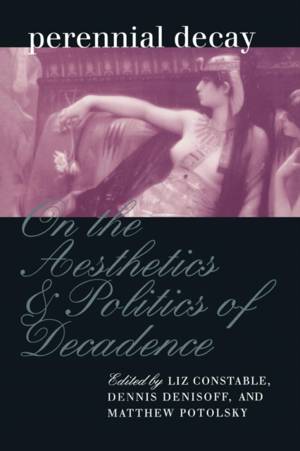
- Afhalen na 1 uur in een winkel met voorraad
- Gratis thuislevering in België vanaf € 30
- Ruim aanbod met 7 miljoen producten
- Afhalen na 1 uur in een winkel met voorraad
- Gratis thuislevering in België vanaf € 30
- Ruim aanbod met 7 miljoen producten
Zoeken
Perennial Decay
On the Aesthetics and Politics of Decadance
€ 60,95
+ 121 punten
Omschrijving
When Oscar Wilde was convicted of gross indecency in 1895, a reporter for the National Observer wrote that there was "not a man or a woman in the English-speaking world possessed of the treasure of a wholesome mind who is not under a deep debt of gratitude to the marquis of Queensberry for destroying the high Priest of the Decadents." But reports of the death of decadence were greatly exaggerated, and today, more than one hundred years after the famous trial and at the beginning of a new millennium, the phenomenon of decadence continues to be a significant cultural force.
Indeed, "decadence" in the nineteenth century, and in our own period, has been a concept whose analysis yields a broad set of associations. In Perennial Decay, Emily Apter, Charles Bernheimer, Sylvia Molloy, Michael Riffaterre, Barbara Spackman, Marc Weiner, and others extend the critical field of decadence beyond the traditional themes of morbidity, the cult of artificiality, exoticism, and sexual nonconformism. They approach the question of decadence afresh, reevaluating the continuing importance of late nineteenth-century decadence for contemporary literary and cultural studies.Specificaties
Betrokkenen
- Uitgeverij:
Inhoud
- Aantal bladzijden:
- 328
- Taal:
- Engels
- Reeks:
Eigenschappen
- Productcode (EAN):
- 9780812216783
- Verschijningsdatum:
- 1/01/1998
- Uitvoering:
- Paperback
- Formaat:
- Trade paperback (VS)
- Afmetingen:
- 152 mm x 226 mm
- Gewicht:
- 498 g

Alleen bij Standaard Boekhandel
+ 121 punten op je klantenkaart van Standaard Boekhandel
Beoordelingen
We publiceren alleen reviews die voldoen aan de voorwaarden voor reviews. Bekijk onze voorwaarden voor reviews.






